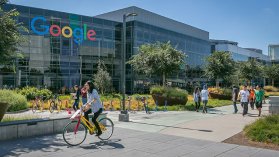Network infrastructure
We design and build the world's most innovative and efficient datacenter networks and end-host networking stacks, to enable compute and storage not available anywhere else.
About the team
Our team brings together experts in networking, distributed systems, kernel and systems programming, end-host stacks, and advanced algorithms to create the datacenter networks that power Google. Our networks are among the world’s largest and fastest, and we design them to be reliable, cheap, and easy to evolve. We often use new technologies unavailable outside Google.
We exemplify Google’s Hybrid Approach to Research: we deploy real-world systems at global scale. Many members of our team have extensive research experience, we publish papers in conferences such as SIGCOMM, NSDI, SOSP, and OSDI, and we work closely with interns and faculty from leading universities.
Every Google product relies on the technologies we develop. Our networks support complex, highly-available, planetary-scale distributed systems with billions of users. We constantly evolve our networks to meet the requirements of, and create opportunities for, new and better Google products, especially the rapidly-growing Google Cloud.
Our team works in many locations: Sunnyvale CA, New York City, Madison WI, Boulder CO, Reston VA, and Seattle WA.
Team focus summaries
All networks are subject to congestion; we want to operate ours at high utilization levels (to reduce costs) while meeting strict performance objectives. We’re inventing new congestion avoidance protocols, and improving our global-scale, near-real-time, automated traffic engineering system. We’re building better ways to measure our networks, accurately and at scale, to drive our evaluation of congestion-control techniques, and as real-time input to automated traffic management.
We continue to innovate in designs for scalable, fast, cheap, reliable, and evolvable data-center networks. When necessary, we design our own hardware, and innovate in network topology and routing protocols. We use automatic techniques to optimize network designs.
We’re building automated network management systems, enabling us to rapidly repair and improve our networks with little or no downtime. We’re using techniques such as formal modeling of network topologies and highly-available distributed systems, while working closely with Google’s network engineers and operators to implement automated workflows.
We’re developing new mechanisms for low-latency, CPU-efficient communication. We want our network switches and endpoints to implement novel packet-processing functions without compromising on cost or performance. We’re exploring hardware and software techniques for fast, flexible, safe packet processing, including onload, offload, RDMA, P4, and more.
We employ SDN extensively. We were early users of, and contributors to, OpenFlow, and continue, with P4, to raise the level of abstraction for silicon-agnostic switching. We are developing SDN controller platforms that can handle Google’s needs for scale and reliability, and SDN applications for routing, traffic management, and other functions.
To introduce network innovations into production as rapidly as possible, without compromising availability, we test our designs and implementations early, often, and extensively. We’re developing advanced software validation techniques, we embrace automation in all aspects of testing and qualification, and we build powerful infrastructure for testing, debugging, and root-causing, in both physical and emulated testbeds.
The huge growth in ML training and inference workloads has created unprecedented demands for improved network bandwidth, latency, and reliability. These workloads are qualitatively different from traditional computation. We are developing novel networking designs in response to rapid innovations in LLM software, accelerators such as GPUs and TPUs, and networking hardware.
Featured publications
Some of our locations
Some of our people
-

Jeffrey C. Mogul
- Networking
- Software Systems
-

Nandita Dukkipati
- Networking
- Software Systems
-

Yuchung Cheng 鄭又中
- Distributed Systems and Parallel Computing
- Networking
- Software Systems
-

Philip M Wells
- Hardware and Architecture
-

Marc de Kruijf
- Distributed Systems and Parallel Computing
- Hardware and Architecture
- Networking
-

Steve Gribble
- Distributed Systems and Parallel Computing
- Hardware and Architecture
- Networking
-

Christopher Alfeld
- Distributed Systems and Parallel Computing
- Hardware and Architecture
- Networking
-

Junlan Zhou
- Distributed Systems and Parallel Computing
- Networking
- Software Systems
-

Rui Wang
- Networking
-

Hassan Wassel
- Distributed Systems and Parallel Computing
- Hardware and Architecture
- Networking
-

Leon Poutievski
- Networking
-

Andrew D. Ferguson
- Networking
Join our team
Open role(s)
- Software Engineer, PhD, Early Career, Infrastructure, 2026 Start: Learn more
- PhD-level software engineers in Network Infrastructure apply their research training to the toughest problems of designing and building large-scale, high-performance, high-availability distributed systems to design, manage, measure, and control our datacenter, WAN, and peering-edge SDN networks (each of which has been the subject of at least one SIGCOMM paper). We're also creating innovative end-host stacks, to support CPU-efficient, low-latency, congestion-aware communication, with secure isolation between users. You'll work with other skillful, creative people, including people who wrote research papers you've read, and you'll keep connected with the academic research community.
- Note that this job opening covers teams besides Network Infrastructure; we have several teams looking for a candidates with a mix of various "Systems" skills.



